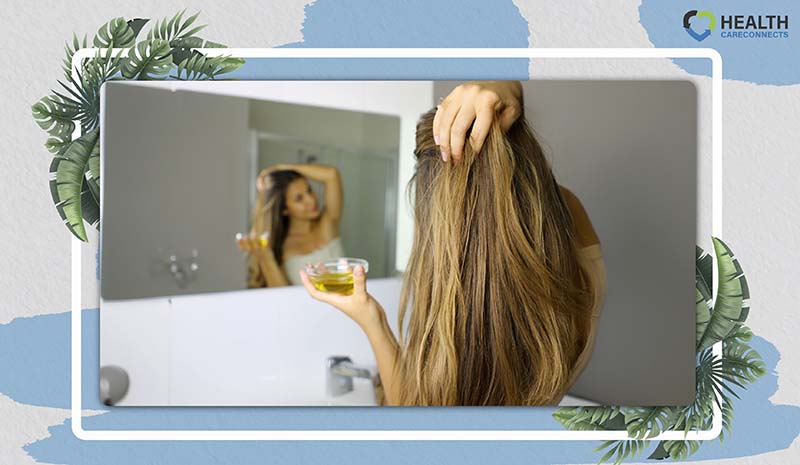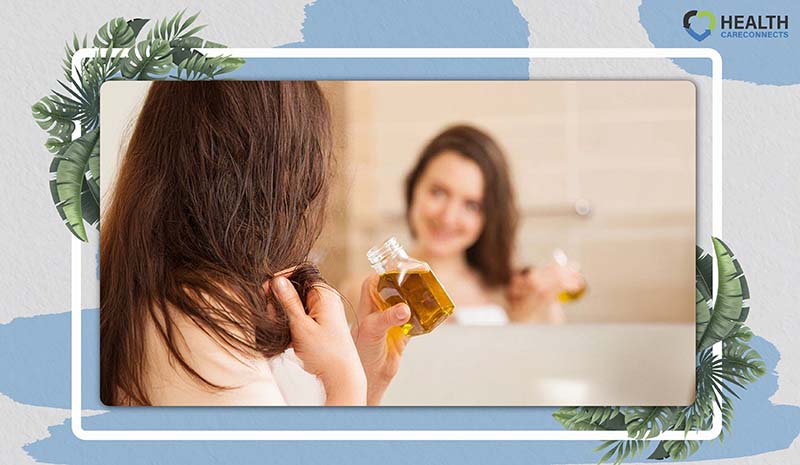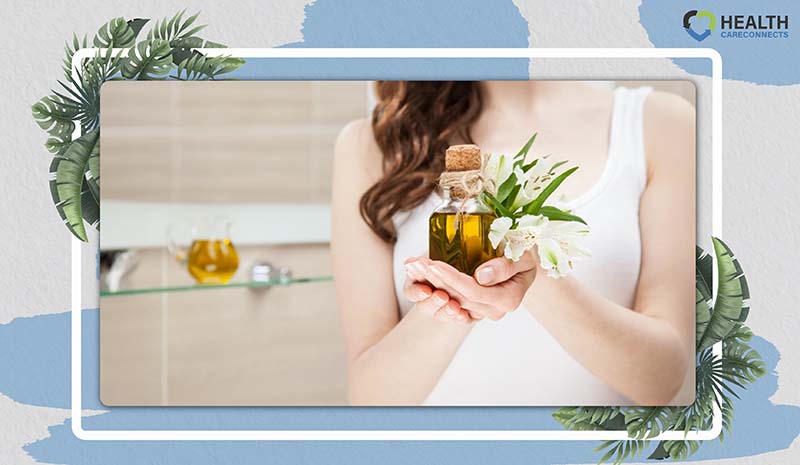Olive oil, typically light yellow or green in color, is extracted naturally by pressing olives. Predominantly imported from Mediterranean countries like Spain, Greece, and Italy, olive oil is celebrated for its rich content of fatty acids and antioxidants.
Its distinctive chemical makeup is why many cultures have historically used it to enhance hair texture and appearance. But does olive oil help hair grow?
We explore the research supporting olive oil’s potential to soothe the scalp, strengthen hair follicles, and stimulate hair growth, aiming for longer, faster-growing, and stronger hair.
Does Olive Oil Help Hair Grow?
As of now, there haven’t been any human clinical trials that definitively prove olive oil’s effectiveness in promoting hair growth or preventing hair loss. The only hint we have comes from a small study done on mice, where they showed increased hair growth after using a substance called oleuropein, commonly found in olives and olive leaves. However, there are a few reasons why we can’t directly apply these findings to humans:
- Olive oil doesn’t contain as much oleuropein as olives or olive leaves.
- Mouse skin and hair are different from human scalp and hair.
- It might take a long time for enough oleuropein from olive oil to be absorbed through the scalp to have any effect.
Until more research is done, the only proven benefit of olive oil for hair is moisturizing, which helps prevent hair breakage due to its high fatty acid content.

Benefits of Olive Oil For Hair and Scalp
Although olive oil hasn’t been proven to directly stimulate hair growth, it does offer several potential benefits for both your hair and scalp, although more research is needed to confirm their effectiveness:
Olive Oil Has Antioxidant Properties
Olive oil contains natural antioxidants, which could help combat oxidative stress caused by UV radiation.
While human studies are lacking, one study on mice showed that topical application of olive oil after UV exposure reduced the development of skin tumors. However, using olive oil before exposure didn’t have the same effect.
Olive Oil Has Anti-inflammatory Effects
Certain phenols found in olive oil have anti-inflammatory properties similar to Ibuprofen.
While ingesting olive oil is known to have anti-inflammatory effects, whether it can soothe scalp inflammation when applied topically requires further investigation.
Olive Oil Helps Moisturize and Soften Hair
The fatty acids in olive oil act as emollients, moisturizing and softening both hair and scalp. They form a protective layer around hair strands, reducing friction-induced breakage and split ends.
Additionally, olive oil can seal the hair cuticle, locking in moisture for longer-lasting hydration.
Olive Oil Helps Fight Bacteria
In vitro studies have demonstrated that olive oil possesses antimicrobial properties, including antifungal effects. It has shown efficacy against candida, reducing its presence by 50%. This suggests that olive oil might help prevent or treat yeast infections on the scalp, such as dandruff or seborrheic dermatitis.
However, further research is needed to confirm its effectiveness when applied topically to combat the fungi responsible for these conditions. It’s worth noting that some medical professionals caution that olive oil could potentially worsen dandruff and seborrheic dermatitis by nourishing the yeast that causes them.

Side Effects of Olive Oil
Olive oil is generally considered safe for both consumption and topical use on the scalp and hair. It’s unlikely to cause significant irritation or damage to the skin, and allergic reactions are rare and usually mild.
However, due to its high fatty acid content, excessive use of olive oil on the scalp and hair can lead to greasiness and potentially clogged pores. This may result in scalp acne or folliculitis. Therefore, if you have naturally oily hair, it’s best to avoid using olive oil excessively. Additionally, always ensure thorough shampooing to cleanse the scalp after using olive oil on your hair.
How to Use Olive Oil for Hair Properly
Olive oil is a versatile addition to your hair care arsenal. While there’s no concrete proof that it directly boosts hair growth, it’s excellent for softening, moisturizing, and conditioning your hair, particularly if you deal with dry or brittle strands. Here’s how you can incorporate olive oil into your routine:
Start by warming a few drops of olive oil in your hands, then gently massage it into your scalp. This helps in improving blood circulation and prepping your hair for nourishment. To evenly distribute the oil through your hair, use a fine-tooth comb. Since olive oil can leave stains, protect your clothing and furniture by wrapping your hair in a towel or wearing a shower cap.
For a more potent treatment, blend olive oil with other essential oils known for their hair benefits. Rosemary oil is celebrated for promoting hair thickness and growth, while peppermint oil stimulates the scalp, offering a refreshing sensation. Combine your chosen essential oil with olive oil and apply as a hair mask. Leave this mixture on for about 30 minutes before rinsing thoroughly.
To specifically target split ends and avoid a greasy scalp, apply olive oil only to the affected areas. This localized application allows the oil to deeply penetrate and fortify the ends of your hair without weighing down the rest of your mane. You can leave the oil on for an extended period— even overnight if your ends are particularly frayed—before washing.

Who Is Olive Oil Suitable for?
Olive oil is particularly suitable for individuals with curly, thick, and coarse hair types that are prone to frizz and dryness. Its moisturizing properties can help nourish and tame unruly curls, providing hydration and shine.
However, olive oil may not be ideal for those with fine or straight hair, as it could potentially weigh down strands and leave them feeling greasy.
Additionally, if you have dandruff, it’s advisable to avoid using olive oil in your hair, as it may exacerbate the condition for some individuals.
Can Olive Oil Be Used Directly on Hair?
Absolutely, pure olive oil can be applied directly to your hair without the need for dilution. It is generally safe and unlikely to cause irritation or burns on your scalp.
Furthermore, olive oil can also serve as a carrier oil, allowing you to dilute other essential oils for hair care purposes.
Conclusion
In conclusion, while olive oil is often touted for its ability to promote healthy hair growth, there is still a lack of definitive scientific evidence to fully confirm its effectiveness. Olive oil is enriched with proteins, antioxidants, and antimicrobial agents that may contribute positively to hair health.
Regular application of olive oil could help to fortify hair follicles, potentially extending the life of each strand and giving the appearance of quicker growth. Given its affordability, experimenting with olive oil as a hair treatment can be a worthwhile endeavor if you’re exploring natural hair care options. So, does olive oil help hair grow? While the verdict may still be out, its potential benefits make it a popular choice for those seeking natural remedies.
For those seeking more information and honest product reviews, I recommend visiting HealthCareConnect. Explore firsthand experiences from users and gain valuable insights to help inform your decision.

Dr. Joyce Slater: Your Guide to Informed Health Choices
Dr. Joyce Slater shines as a distinguished expert in the field of nutrition and public health. Contributing her vast expertise to HealthConnectbc, she embodies a deep-seated passion for enhancing public well-being. As a respected figure in her field. Dr. Slater’s academic journey and professional achievements are nothing short of inspirational.
Holding a significant position as a researcher and educator, Dr. Slater has delved deeply into the intricacies of food literacy and nutritional science. Her work, prominently featured in numerous esteemed scientific publications, underscores her dedication to expanding our understanding of food’s role in health and society.
At the heart of Dr. Slater’s professional ethos is a profound desire to positively impact individual lives through education and research. She often says, “Empowering people with the knowledge to make healthier choices is the most rewarding aspect of my work.” This principle is the cornerstone of her involvement with HealthConnectbc, where she strives to provide reliable and practical health advice.
Dr. Slater’s contributions to HealthConnectbc are multifaceted: academically, she offers insights into the complex world of nutrition and health, enhancing both public understanding and professional practices. Additionally, she is instrumental in guiding and inspiring the next generation of health professionals, thus fostering future excellence in the field.
Juggling rigorous research with her educational duties, Dr. Slater demonstrates an unwavering commitment to her profession. Her approachable nature and genuine concern transcend the confines of academia, touching the lives of everyone she interacts with. Dr. Slater looks forward to continuing her journey of discovery and education, dedicated to the ongoing improvement of public health and nutrition.
At HealthConnectbc, Dr. J. Slater is not just a contributor; she is a guiding light, dedicated to enlightening and motivating individuals towards a healthier and more informed lifestyle.
PUBLISHED ARTICLES
- Food literacy competencies: A conceptual framework for youth transitioning to adulthood (2018)
- Self-perceived eating habits and food skills of Canadians (2016)
- Challenges to acquiring and utilizing food literacy: Perceptions of young Canadian adults (2016)
- Socio-demographic and geographic analysis of overweight and obesity in Canadian adults (2009)
- Sustainable well-being: Concepts, issues, and educational practices (2014)

